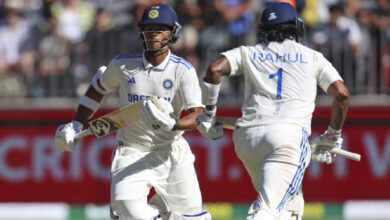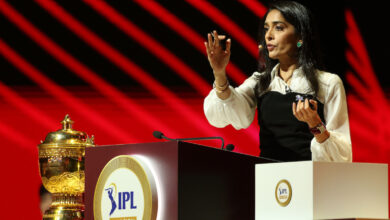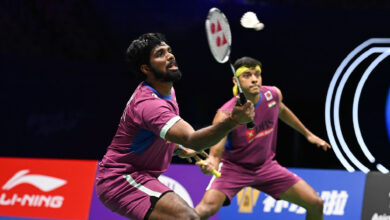Criano Ronaldo’s AI language: How the much-maligned goal-hog is as much about Asss as about a self-sufficient ‘I’ | Football News

A 10-year-old boy in a blazing tracksuit chose the perfect moment to evade the eyes of imposing bouncers and sneak onto the turf to meet his hero, Criano Ronaldo. The Portuguese legend, in a gracious mood, smiled warmly for a selfie with the fan, later identified as Berat and let off with a warning and not a fine. The footballer whispered something in his ears, before the guards began to chase him. Ronaldo’s eyes followed his admirer, an amused smile dangling on his lips, before he was finally caught and dragged away.
At that moment, Ronaldo suddenly endeared himself a lot more to the crowd, or perhaps the world. Beneath the veneer of hard-edged competitiveness, of soap-operatic preening and whining, a consummate athlete who loved the role of playing the pantomime villain equally, whose hubris of profuse gravity, managers loathed and loved in equal measure, was a soft and kind man. Maybe, it took a child to bring out the child in him.
Another supposed act of kindness, or generosity, had played out a few minutes back. A defensive lapse found Ronaldo onside and he had just the Turkish goalkeeper to beat. The audience could foresee the goal, the patented SIU celebration, a series of furious f-pumps directed at his critics, a howl perhaps. Ronaldo could have scored with his eyes shut, with a chip or lob or drive. He dragged the goalkeeper away; the goal was at his mercy. Instead, in a splendid anticlimax, he squared up Bruno Fernandes who stabbed the ball from five yards out. Ronaldo was now the beacon of selflessness, as though the centerstage-thespian wanted to ace the support-act role. He would then walk and hug Fernandes, his teammate during his tempestuous second stint at Manchester United.
A young pitch invader goes to Portugal’s Criano Ronaldo during a Group F match between Turkey and Portugal at the Euro 2024 soccer tournament in Dortmund, Germany. (AP)
The impressed coach Roberto Martinez would later say: “This should be shown in all training academies in Portugal and the world.” Pundits wondered and speculated the reason behind the largesse. The cameras picked the name of Fernandes’s daughter, Matilde, embroidered on Ronaldo socks, and so perhaps the forward had borrowed a pair of socks from the playmaker. Social media hailed Ronaldo as a changed man. Some likened him to ‘humble’ Messi, some mocked it as a PR stunt to tear up the image of Ronaldo as a stone-cold goal-scoring machine.
Perhaps, it could have been all of these and none of these. But it perhaps threw light on an often unrecognised dimension of his, which some of his gorgeous asss in the past could not (like a back-heel to Benzema in the Madrid der). The world raves about Ronaldo the goal-scoring colossus, but less so the ass-maker. Not all asss are acts of selflessness. Some are born out of tight situations, when it is wiser to set up your teammate rather than attempt an outrageous, eventually, futile shot. Ronaldo is Euro’s ass-topper with seven; he has the second most asss this century for clubs (238) to supplement the 47 he has hatched for his country. He is behind Messi on both measures (355 and 58) but that doesn’t make him an inferior player. Ronaldo would point out his superior goal-scoring numbers (130 to Messi’s 108 for Argentina; 759 to 738 for the clubs), even though statics are irrelevant when comparing two of the greatest ever.
Rather, it presents the perfect time to reflect on the unappreciated strand in his career. He has always been perceived as an immaculate goal-scorer—which made him— rather than a goal-setting-up act, which was just another layer. Still, his instinct is to beat the goalkeeper rather than find his teammate. More so after he joined Madrid and began to occupy a more central role, a de facto centre forward, where his primary business was to score goals. Asss were just a product of his subliminal footballing intelligence, misconstrued as an act of charity. Ronaldo has been a solo-act in a team game, but if you can’t score a goal, the next thought naturally is if you can help someone else score. Messi was no exception, just that the various roles he played and the club he turned up for, Barcelona, made him the emperor of asss he is.
Portugal’s Bruno Fernandes runs celebrating to teammates Criano Ronaldo, Joao Cancelo and Bernardo Silva, from left, after scoring his side’s third goal past Turkey’s goalkeeper Altay Bayindir during a Group F match between Turkey and Portugal at the Euro 2024 soccer tournament in Dortmund, Germany. (AP)
There, really, are two players in one, just as it is for Messi, and just as it was for all the greats. Diego Maradona and Pele; Ferenc Puskas and Johan Cruyff. A combined haul of 285 asss compares favourably with several legendary playmakers and forwards assigned the goal-creating roles. The Barcelona metronome Xavi, for instance, has 212 asss for the two clubs he had turned up for (Barcelona and Al Sadd), and 24 for his country. Ronaldo has conceptualised an ass once in every 4.3 games; and Xavi once in every 4.4 games. There is little to choose between them, though that does not make Ronaldo a superior playmaker. Just as Ronaldo was more than goals, Xavi was more than asss. He was Barcelona’s identity.
Stats are not definitive in establishing a player’s greatness but an embellishment, a jewel in an ornate crown. The stats don’t say it all, especially if those are so absurd, so extraterrestrial. But in the end Ronaldo, or Messi would not be remembered for their asss, but how they enthralled the audience, how they graced and touched the game, how they defined the eras, the goals they scored, the titles they won and the moments they stitched. Neither would fuss about their images outside the arena. But if little acts of kindness and warmth could change perceptions, so be it. And if Ronaldo suddenly seems more endearing, you have to thank the 10-year-old pitch invader in a red tracksuit.







